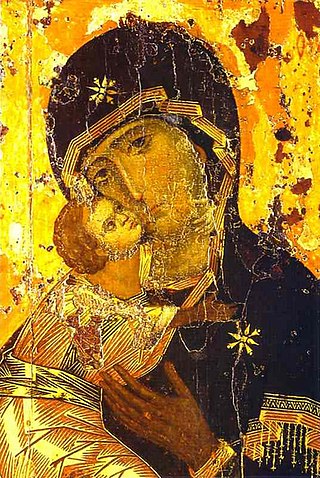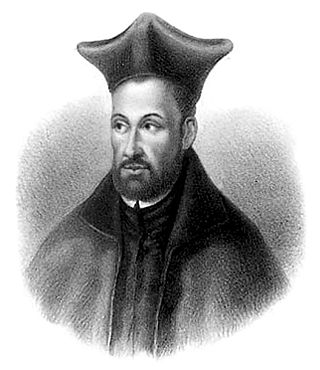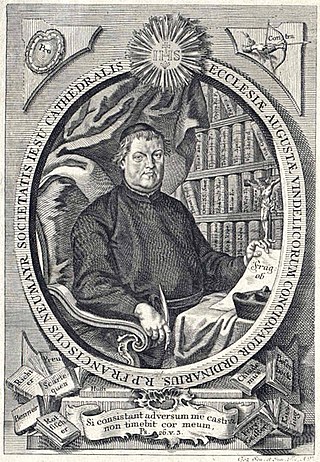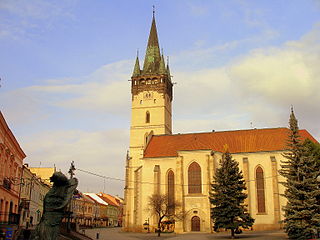
The Counter-Reformation, also sometimes called the Catholic Revival, was the period of Catholic resurgence that was initiated in response to, and as an alternative to, the Protestant Reformations at the time. It is frequently dated to have begun with the Council of Trent (1545–1563) and to end with the conclusion of the European wars of religion in 1648, though this is controversial. The broader term Catholic Reformation also encompasses reforms and movements within the Church in the periods immediately before Protestantism or Trent and lasting later.

The perpetual virginity of Mary is a Christian doctrine that Mary, the mother of Jesus, was a virgin "before, during and after" the birth of Christ. In Western Christianity, the Catholic Church adheres to the doctrine, as do some Lutherans, Anglicans, Reformed, and other Protestants. In Eastern Christianity, the Oriental Orthodox Churches and the Church of the East both adhere to this doctrine as part of their ongoing tradition, and Eastern Orthodox churches recognize Mary as Aeiparthenos, meaning "ever-virgin". It is one of the four Marian dogmas of the Catholic Church. Most modern nonconformist Protestants reject the doctrine.

Peter Faber, SJ was a Savoyard Catholic priest, theologian and co-founder of the Society of Jesus, along with Ignatius of Loyola and Francis Xavier. Pope Francis announced his canonization in 2013.

Peter Canisius was a Dutch Jesuit priest. He became known for his strong support for the Catholic faith during the Protestant Reformation in Germany, Austria, Bohemia, Moravia, Switzerland and the British Isles. The restoration of the Catholic Church in Germany after the Protestant Reformation is largely attributed to the work there of the Society of Jesus, which he led. He is venerated in the Catholic Church as a saint and as a Doctor of the Church.

The Sodality of Our Lady, also known as the Sodality of the Blessed Virgin Mary, is a Roman Catholic Marian society founded in 1563 by young Belgian Jesuit Jean Leunis at the Roman College of the Society of Jesus. The modern Ignatian lay group Christian Life Community traces its origins to the first Sodality.
Catholic spirituality includes the various ways in which Catholics live out their Baptismal promise through prayer and action. The primary prayer of all Catholics is the Eucharistic liturgy in which they celebrate and share their faith together, in accord with Jesus' instruction: "Do this in memory of me." The Catholic bishops at the Second Vatican Council decreed that "devotions should be so drawn up that they harmonize with the liturgical seasons, accord with the sacred liturgy, are in some fashion derived from it, and lead the people to it, since, in fact, the liturgy by its very nature far surpasses any of them." In accord with this, many additional forms of prayer have developed over the centuries as means of animating one's personal Christian life, at times in gatherings with others. Each of the religious orders and congregations of the Catholic church, as well as lay groupings, has specifics to its own spirituality – its way of approaching God in prayer to foster its way of living out the Gospel.
Franciscus is a Latin given name, originally an epithet meaning "the Frank, the Frenchman". It was applied to Saint Francis of Assisi (1181/82–1226). Francis had been baptized Giovanni (John); his father was Italian and his mother Provençale ; his father was on business in France when he was born, and when he returned to Assisi, he began to call his son by the nickname Francesco, in the opinion of G. K. Chesterton possibly because out of a general enthusiasm for all things French, or because of his commercial success in France. After the canonization of Saint Francis of Assisi in 1228, the custom of naming children after saints led to the popularization of Franciscus as a given name. In the vernaculars of western Europe, the name diversified into the forms Francesco (Italian), Francisco, Francesc (Catalan), François, Franz ; besides Frans, the Latin form remains commonly given in Dutch.
The formulary controversy was a 17th- and 18th-century Jansenist refusal to confirm the Formula of Submission for the Jansenists on the part of a group of Catholic ecclesiastical personnel and teachers who did not accept the charge that their beliefs about the nature of man and grace were heretical as the Holy See declared. In the Kingdom of France, it pitted Jansenists against Jesuits. It gave rise to French theologian Blaise Pascal's Lettres provinciales, the condemnation of casuistry by the Holy See, and the dissolution of organised Jansenism.

The Dreikönigsgymnasium is a regular public Gymnasium located in Cologne, Germany. Founded in 1450 by the city of Cologne, it is the oldest school in Cologne and one of the oldest in Germany. In 1556 it was transferred to Jesuit control through the son of the mayor, who had become a Jesuit. The Jesuits continued to run the school until 1778, when control was restored to the city after the papal suppression of the Jesuits of 1773.

Throughout history, Catholic Mariology has been influenced by a number of saints who have attested to the central role of Mary in God's plan of salvation. The analysis of Early Church Fathers continues to be reflected in modern encyclicals. Irenaeus vigorously defended the title of "Theotokos" or Mother of God. The views of Anthony of Padua, Robert Bellarmine and others supported the doctrine of the Immaculate Conception of the Virgin Mary, which was declared a dogma in 1850.
Lutheran Mariology or Lutheran Marian theology is derived from Martin Luther's views of Mary, the mother of God and these positions have influenced those taught by the Lutheran Churches. Lutheran Mariology developed out of the deep Christian Marian devotion on which Luther was reared, and it was subsequently clarified as part of his mature Christocentric theology and piety. Lutherans hold Mary in high esteem, universally teaching the dogmas of the Theotokos and the Virgin Birth. Luther dogmatically asserted what he considered firmly established biblical doctrines such as the divine motherhood of Mary while adhering to pious opinions of the Immaculate Conception and the perpetual virginity of Mary, along with the caveat that all doctrine and piety should exalt and not diminish the person and work of Jesus Christ. By the end of Luther's theological development, his emphasis was always placed on Mary as merely a receiver of God's love and favour. His opposition to regarding Mary as a mediatrix of intercession or redemption was part of his greater and more extensive opposition to the belief that the merits of the saints could be added to those of Jesus Christ to save humanity. Lutheran denominations may differ in their teaching with respect to various Marian doctrines and have contributed to producing ecumenical meetings and documents on Mary.

Catholic Marian movements and societies have developed from the veneration of the Blessed Virgin Mary by members of the Catholic Church. These societies form part of the fabric of Mariology in the Catholic Church. Popular membership in Marian organizations grew significantly in the 20th century, as apparitions such as Our Lady of Fátima gave rise to societies with millions of members, and today many Marian societies exist around the world. This article reviews the major Marian movements and organizations.

Franz Neumayr was a German Jesuit preacher, writer on theological, controversial and ascetical subjects, and author of many Latin dramas on sacred themes.

Stanislaus Papczyński, MIC, born Jan Papczyński and in religion Stanislaus of Jesus and Mary, was a Polish Catholic priest who founded the Marians of the Immaculate Conception, the first Polish religious order for men. He is also widely remembered as a prolific religious writer, including works such as The Mystical Temple of God.

In 16th-century Christianity, Protestantism came to the forefront and marked a significant change in the Christian world.
The following outline is provided as an overview of and topical guide to the Catholic Church:
The following outline is provided as an overview of and topical guide to Protestantism:

The Vision of the Blessed Hermann Joseph or The Mystical Engagement of the Blessed Hermann Joseph to the Virgin Mary is a 1629-1630 painting by the Flemish Baroque painter Anthony van Dyck.












